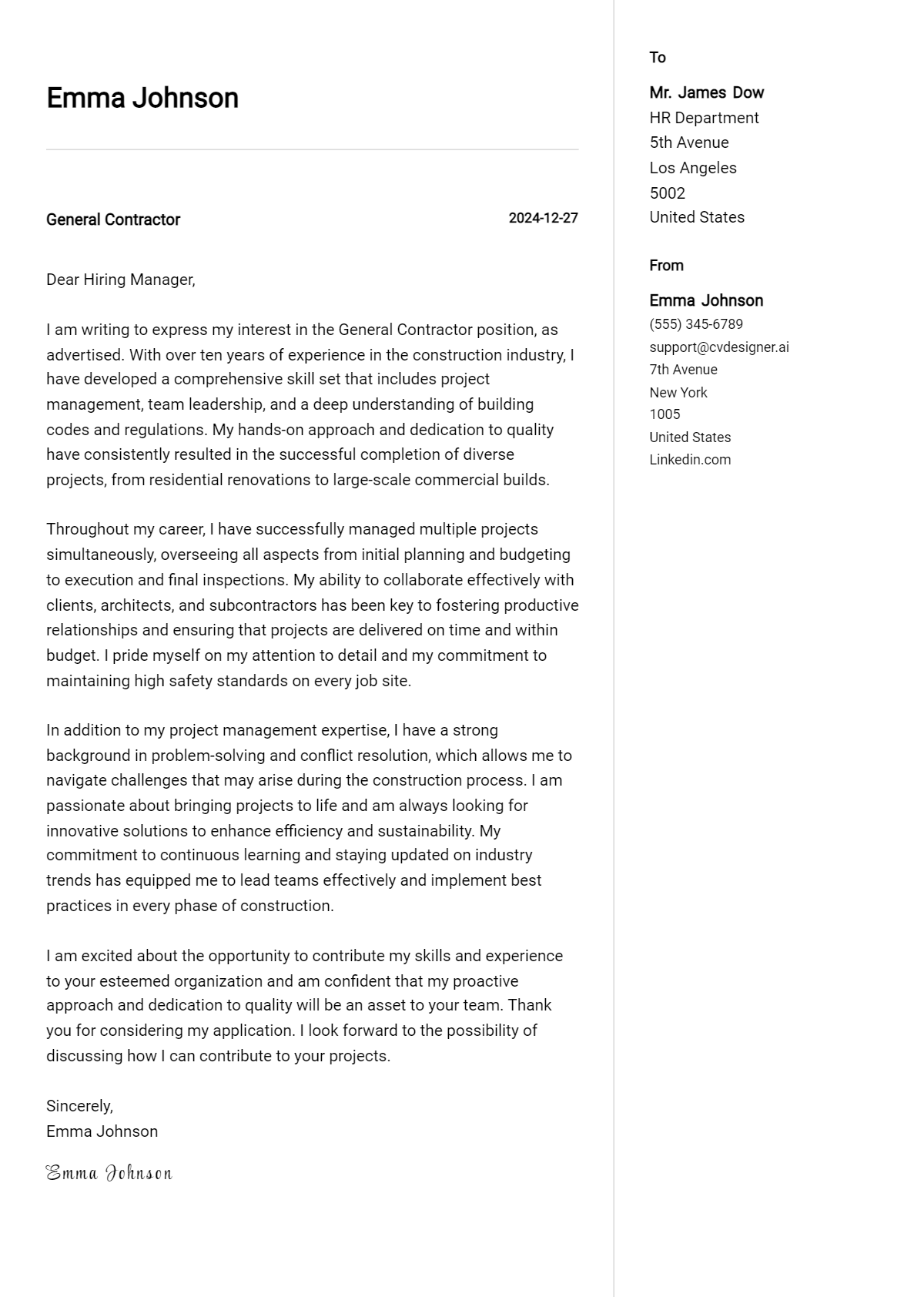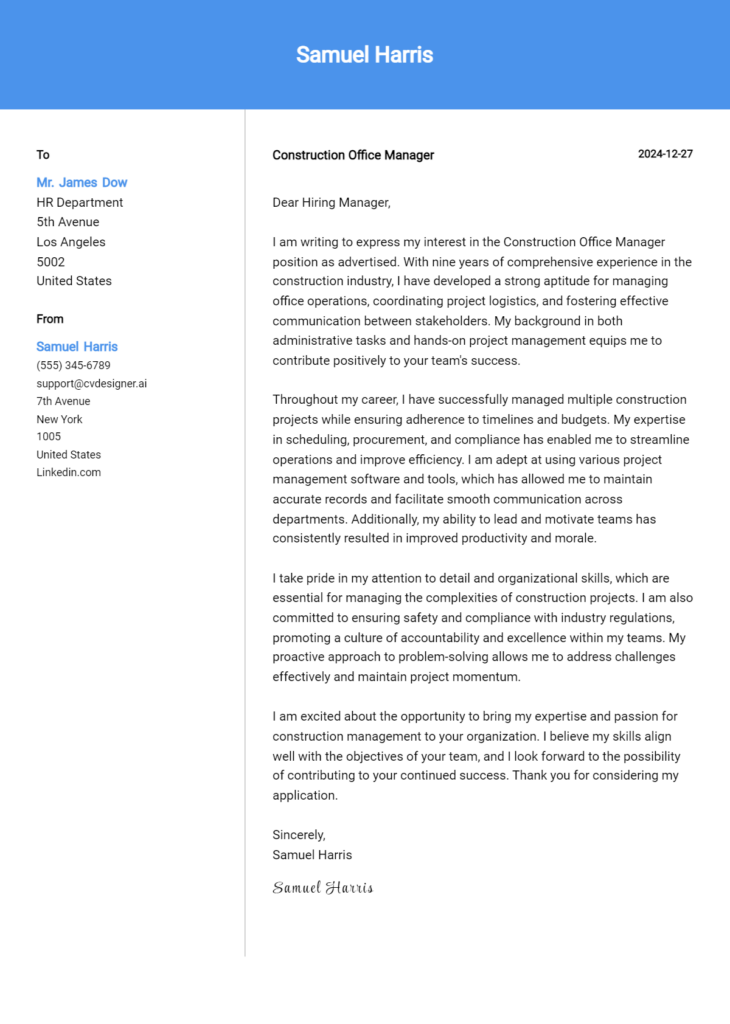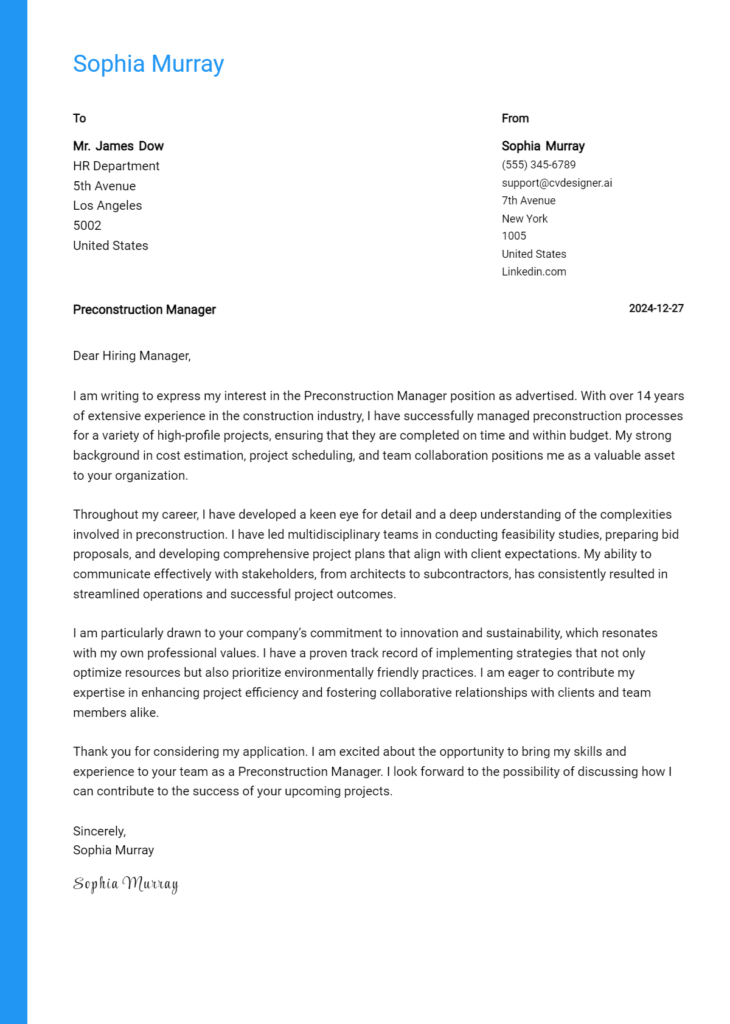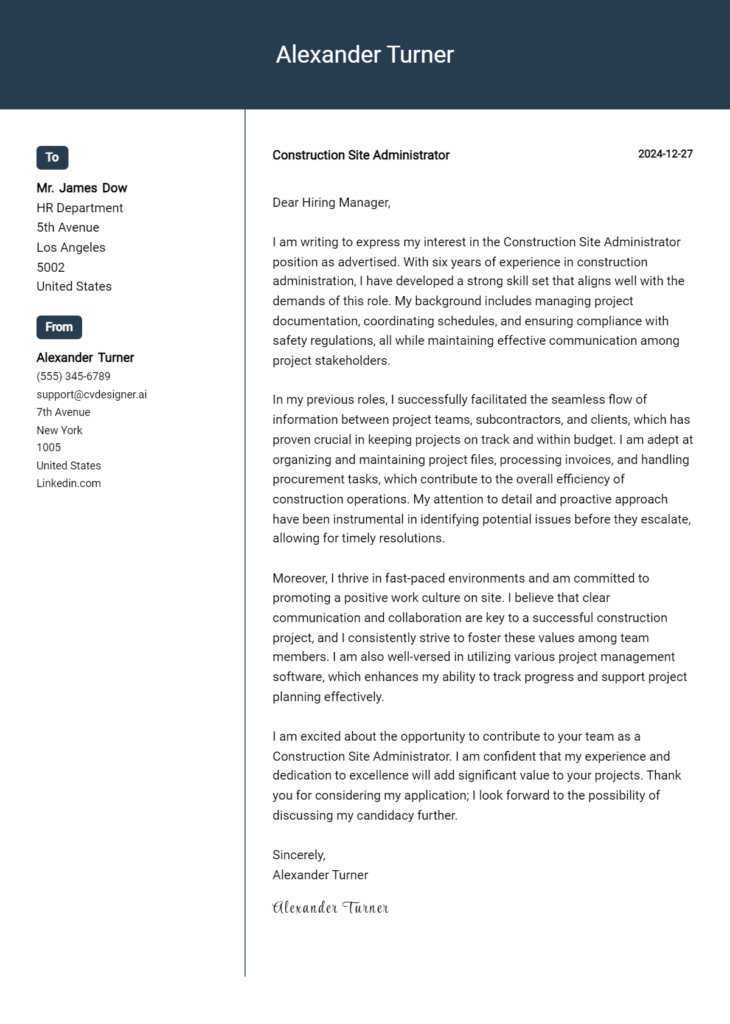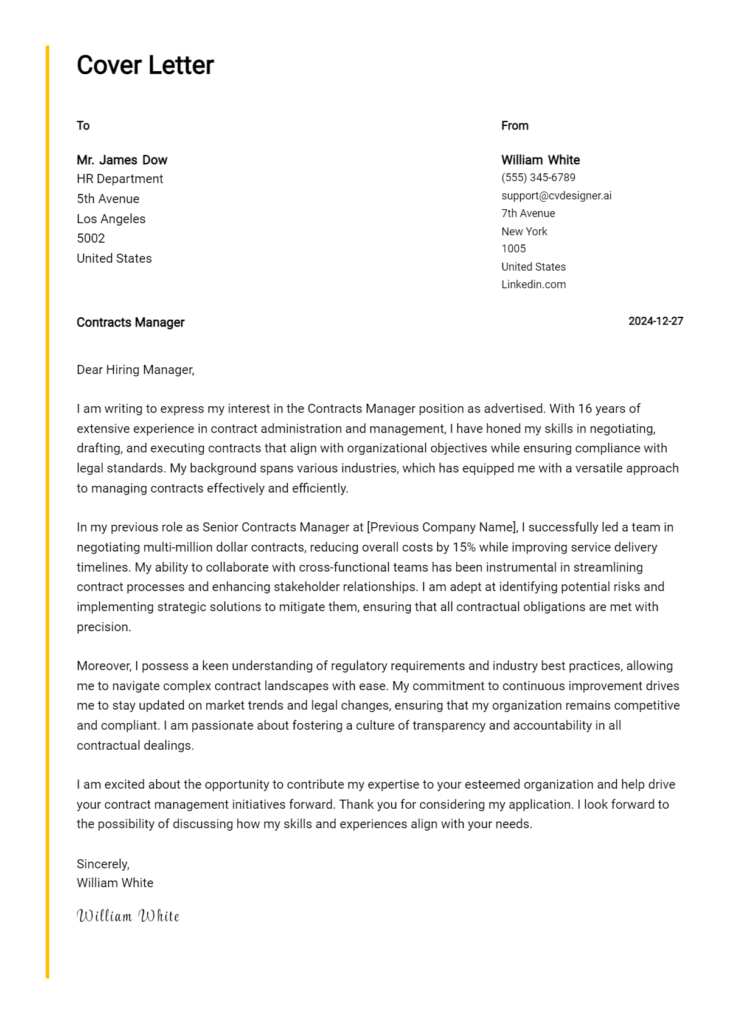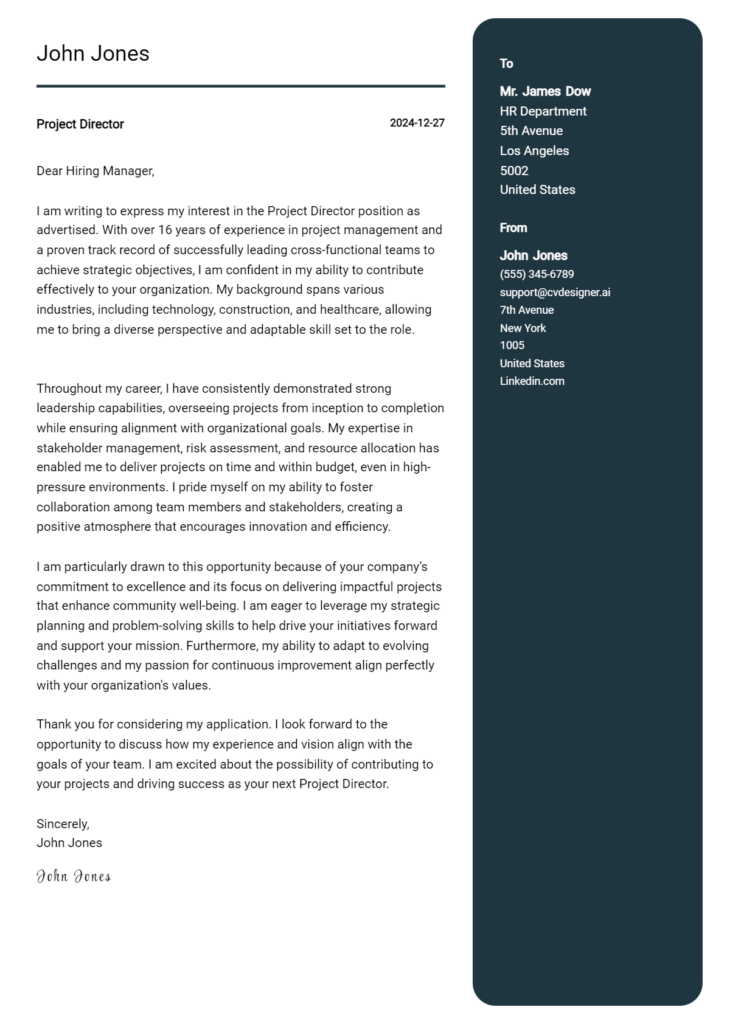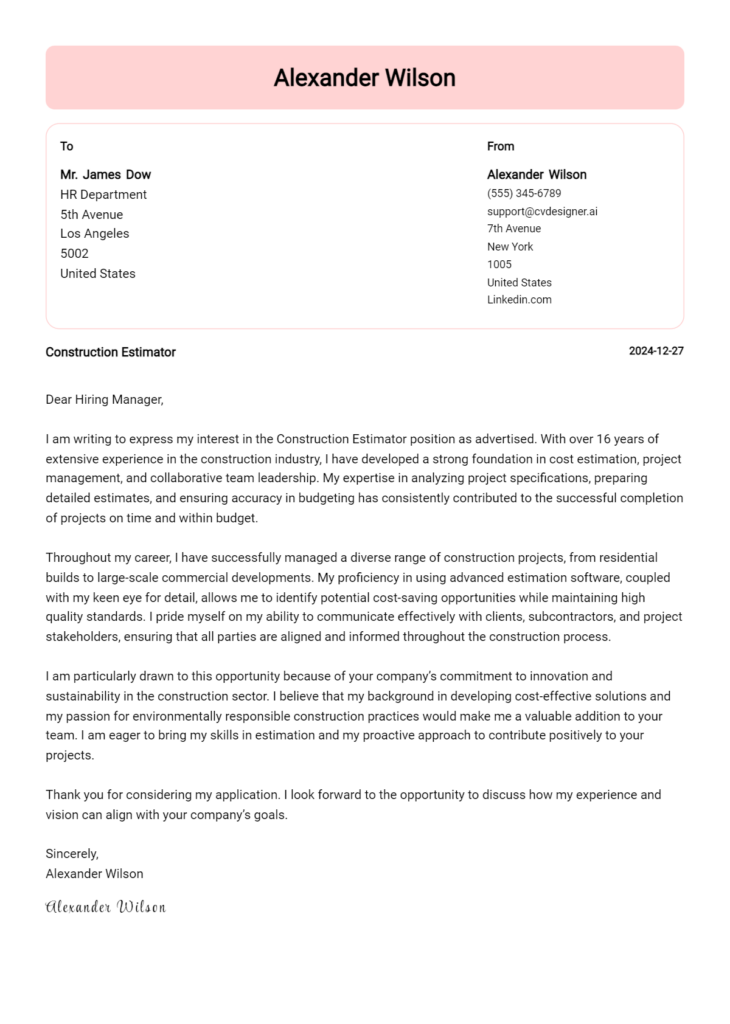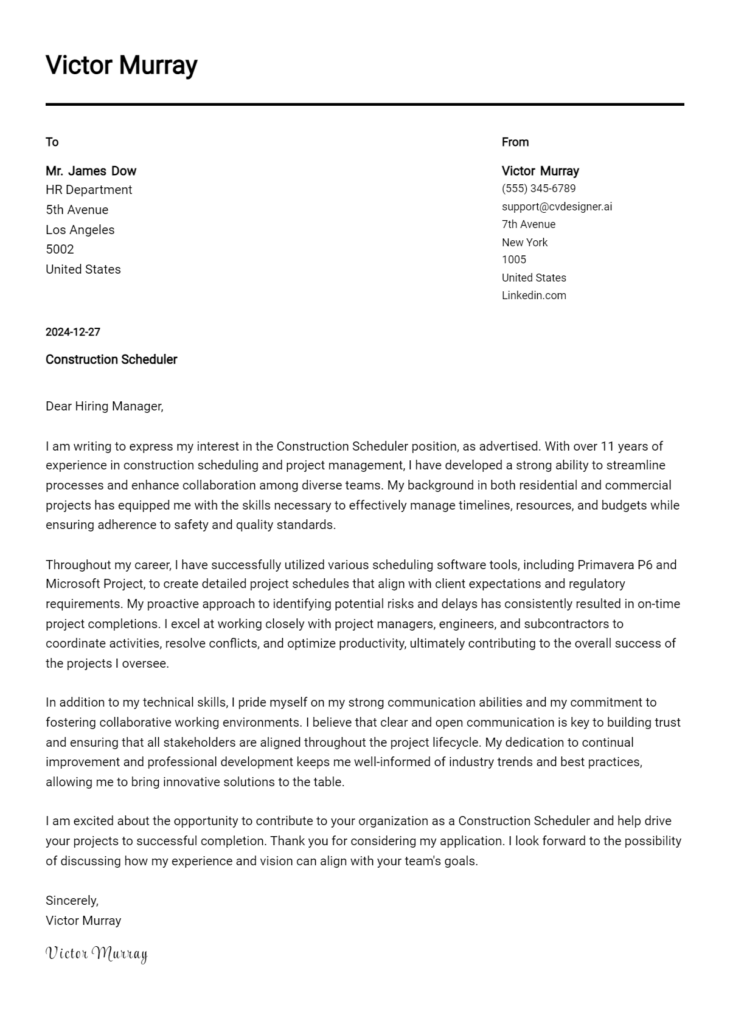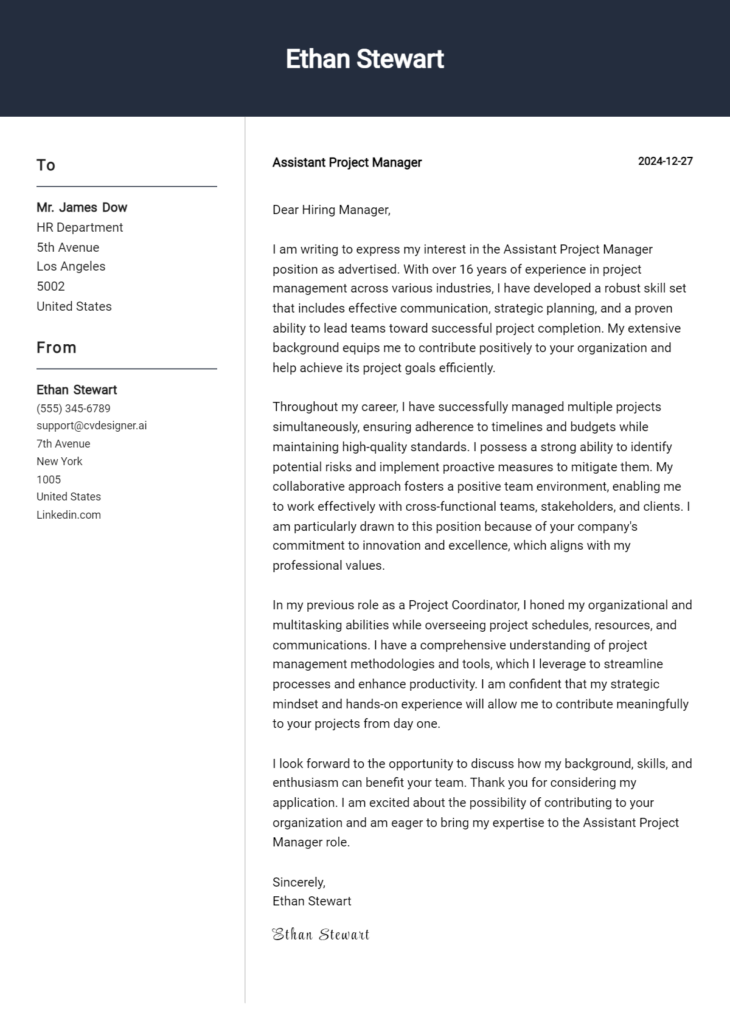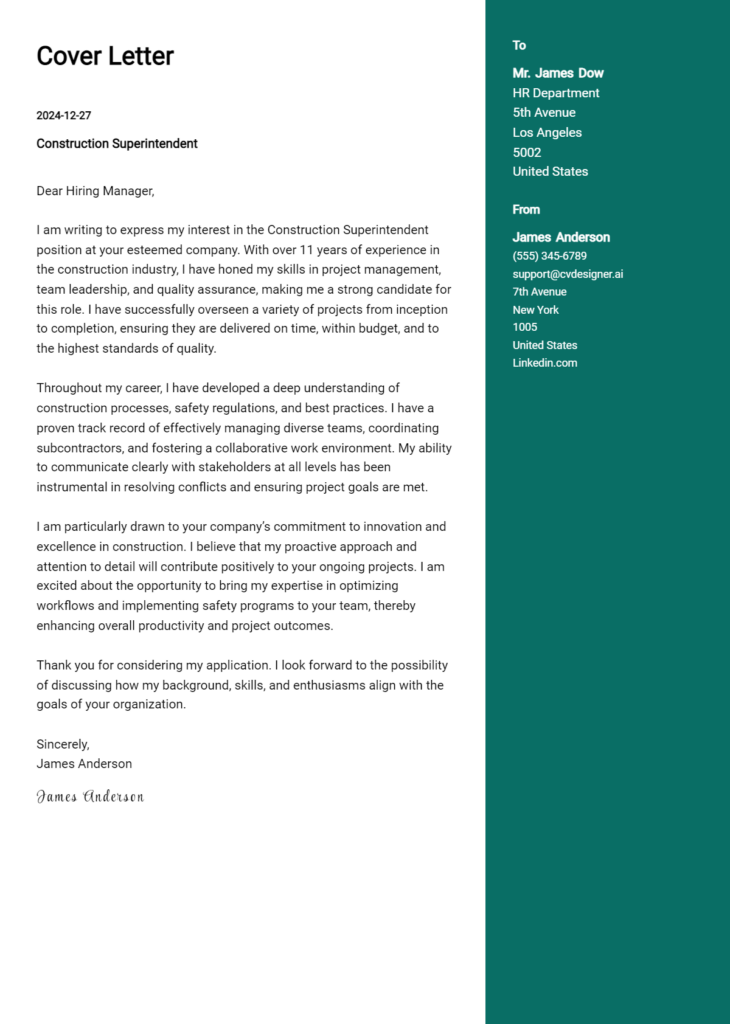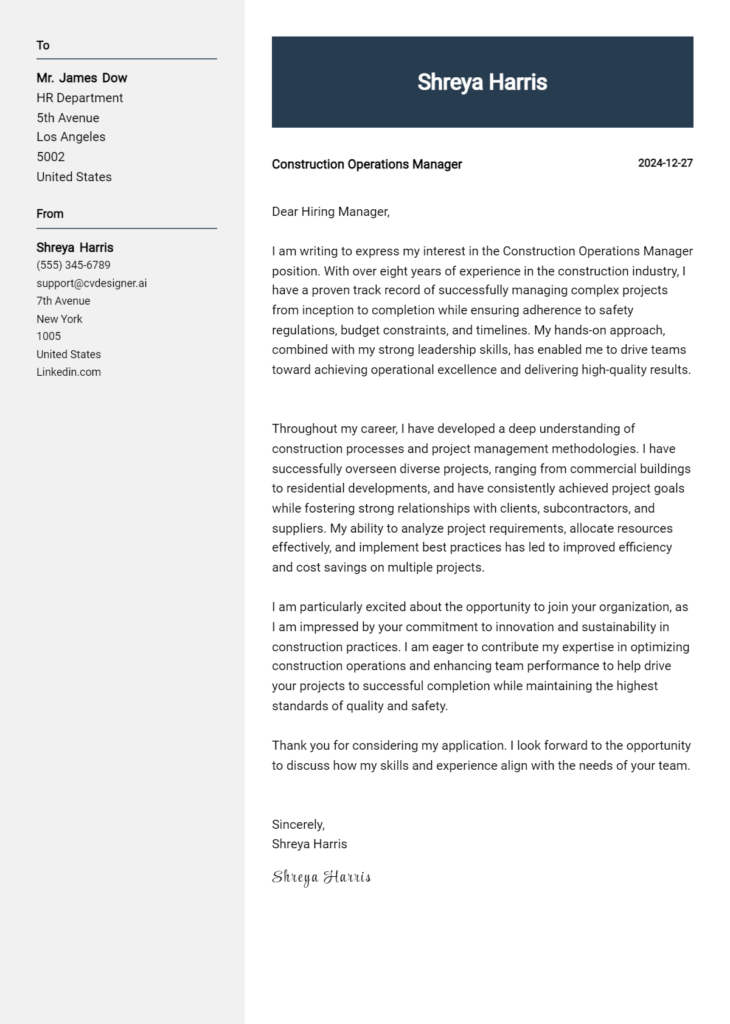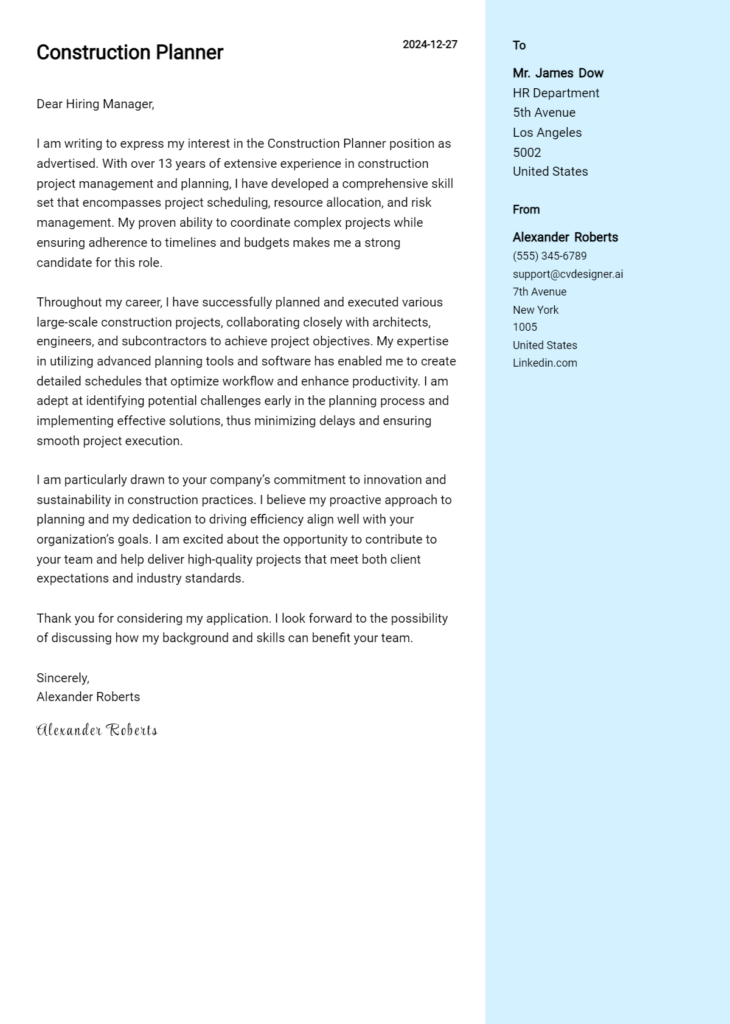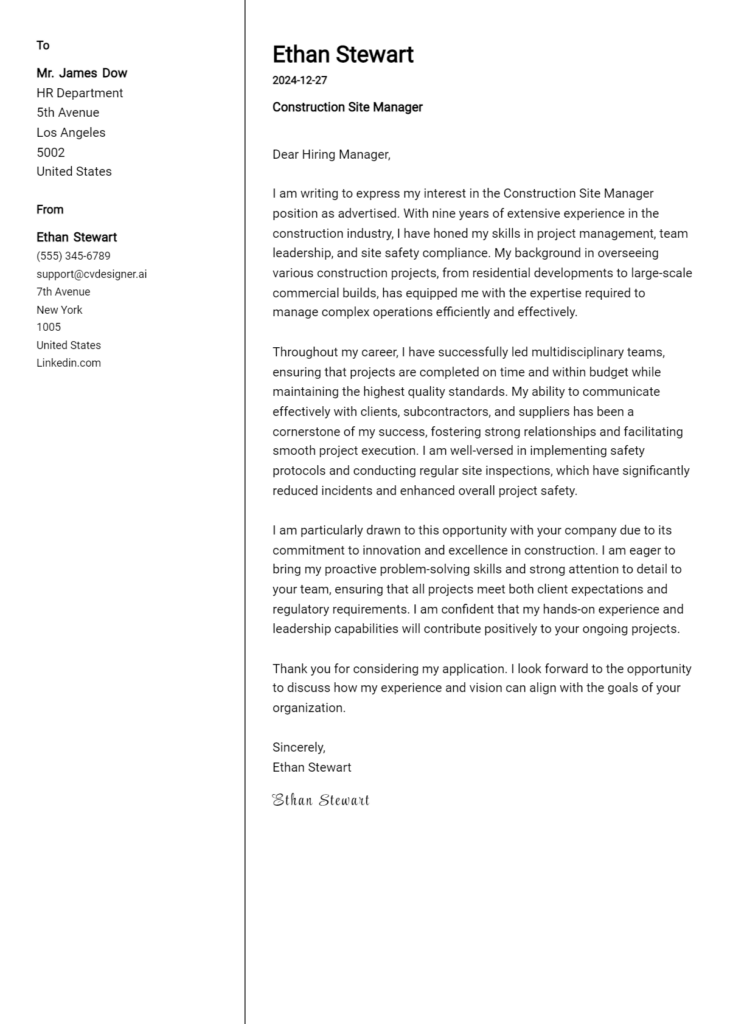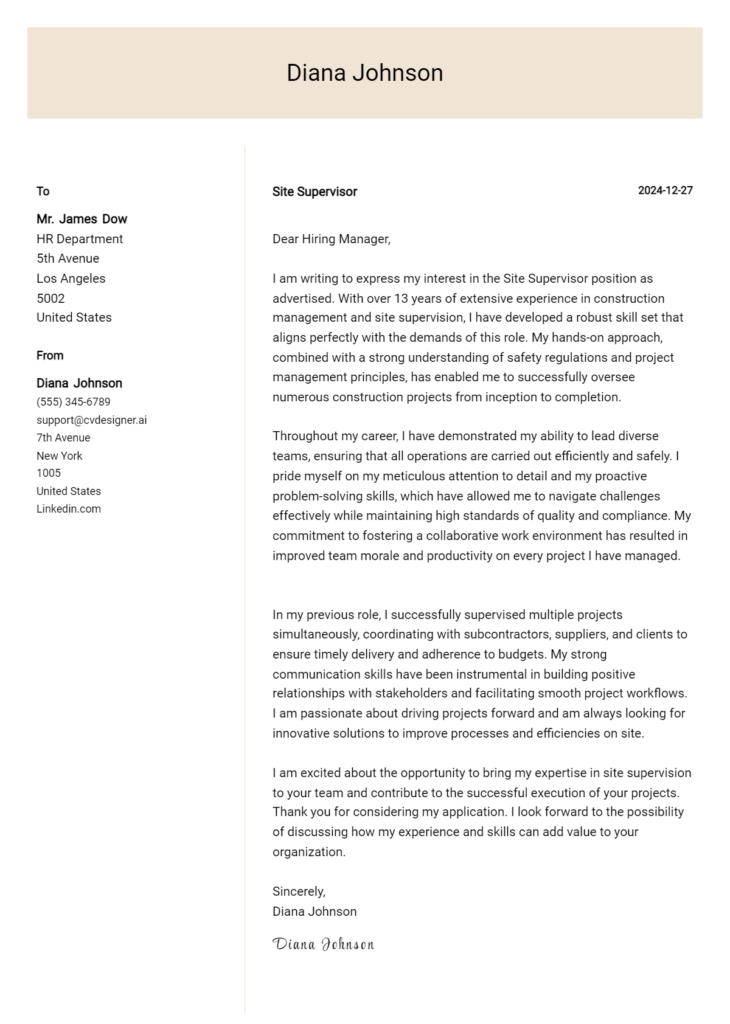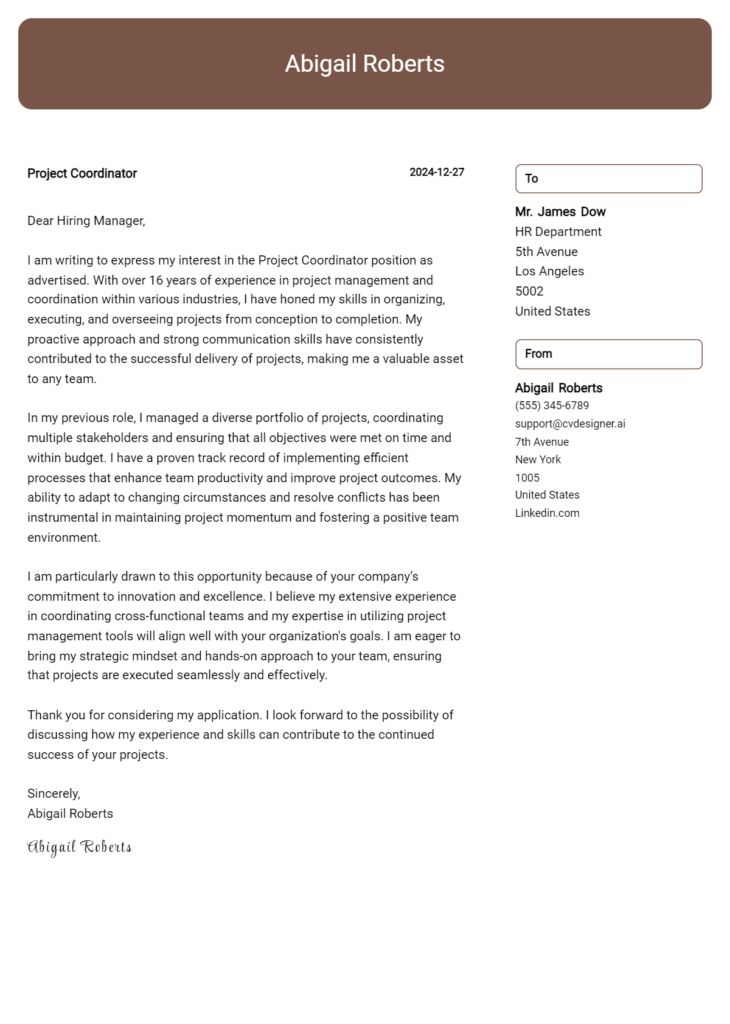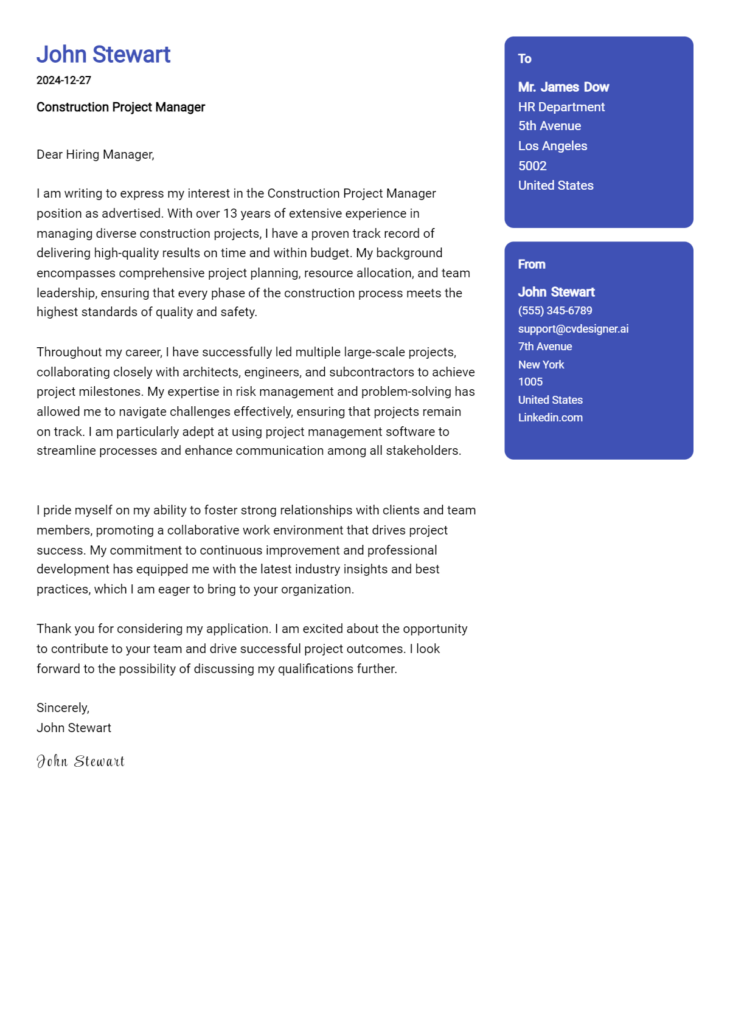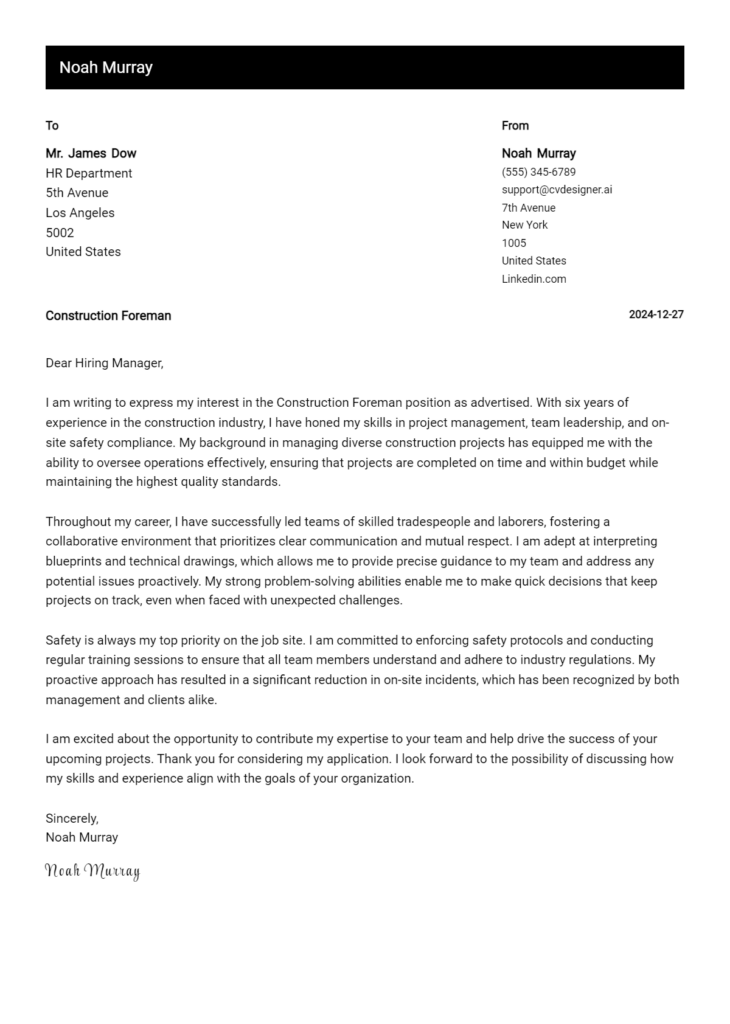General Contractor Cover Letter Examples
Explore additional General Contractor cover letter samples and guides and see what works for your level of experience or role.
How to Format a General Contractor Cover Letter?
Crafting a compelling cover letter is essential for a General Contractor, as it is your first opportunity to make a lasting impression on potential employers. The way you format your cover letter not only showcases your skills and experience but also reflects your organizational abilities and attention to detail—qualities that are paramount in the construction industry. A well-structured cover letter can capture the hiring manager's attention and set you apart from the competition.
In this guide, we’ll outline the key elements of a professional cover letter, providing tips and construction-specific examples to help you build an effective document.
We will focus on the essential components of a General Contractor cover letter, including:
- Cover Letter Header
- Cover Letter Greeting
- Cover Letter Introduction
- Cover Letter Body
- Cover Letter Closing
Each section is crucial for presenting your qualifications and professionalism. Let’s delve into each part and explore how to make your General Contractor cover letter shine.
Importance of the Cover Letter Header for a General Contractor
A well-structured cover letter header is crucial for a General Contractor as it sets the tone for professionalism and clarity. The header should include key contact information such as the contractor's name, phone number, email address, and physical address, along with the date and the recipient's details (name, title, company, and address). This information ensures that the recipient can easily reach out for further communication and reflects the contractor's attention to detail—a vital quality in the construction industry. A clear and professional header can make a significant difference in how your application is perceived.
Strong Example
John Smith 123 Construction Lane Building City, ST 12345 (123) 456-7890 john.smith@email.com October 15, 2023 Jane Doe Hiring Manager ABC Construction Co. 456 Industry Rd. Building City, ST 12345
Weak Example
johns@gmail October 15, 2023 Hi there, ABC Construction
The Importance of a Strong Cover Letter Greeting
The greeting of your cover letter plays a crucial role in establishing the tone for the entire document. It serves as your first impression and can significantly impact how the hiring manager perceives your application. A personalized greeting demonstrates professionalism and shows that you have taken the time to research the company and the individual you are addressing. Instead of using generic salutations like "To Whom It May Concern," aim to address the hiring manager by name. If you’re unsure of who that is, a quick visit to the company’s website or a brief phone call can provide the information you need. A tailored greeting not only enhances your credibility but also conveys your genuine interest in the position.
Here are examples of strong and weak greetings for a General Contractor cover letter:
Strong Greeting Example:
Dear Mr. Johnson,
Weak Greeting Example:
To Whom It May Concern,
Cover Letter Introduction for a General Contractor
A well-crafted cover letter introduction is crucial for a General Contractor as it serves as the first impression to the hiring manager. It should immediately capture attention, express genuine interest in the position, and provide a snapshot of the candidate's relevant skills or achievements. A strong introduction not only sets the tone for the rest of the cover letter but also makes it easier for the hiring manager to envision the candidate as a suitable fit for the role. In contrast, a weak introduction can lead to a missed opportunity, failing to convey the candidate's qualifications or enthusiasm. Below are examples of strong and weak cover letter introductions for a General Contractor.
Strong Example:
Dear [Hiring Manager's Name], I am excited to apply for the General Contractor position at [Company Name], as advertised on [Job Board]. With over 10 years of experience in managing complex construction projects and a proven track record of delivering high-quality results on time and within budget, I am confident in my ability to contribute effectively to your team. My expertise in coordinating subcontractors, ensuring compliance with safety regulations, and fostering strong client relationships positions me as an ideal candidate for this role.
Weak Example:
To whom it may concern, I am writing to apply for the General Contractor job. I have some experience in construction and think I could be a good fit. I have worked on a few projects and have some skills that might be useful.
Purpose of the Cover Letter Body for a General Contractor
The cover letter body serves as a critical component for a General Contractor, allowing the candidate to effectively communicate their unique skills and experiences that make them a valuable asset to the company. It provides an opportunity to showcase specific projects that demonstrate their expertise in project management, budgeting, and collaboration with various stakeholders. By highlighting successful past accomplishments, such as completing a high-profile commercial build under budget and ahead of schedule, the candidate can illustrate their ability to deliver results and contribute positively to the prospective employer's success.
Strong Example
I am excited to apply for the General Contractor position at XYZ Construction. In my previous role, I successfully managed a $5 million residential development project that was completed two months ahead of schedule, resulting in a 15% cost savings. My hands-on experience in coordinating with subcontractors, ensuring compliance with safety regulations, and effectively communicating with clients has equipped me to handle complex challenges in the construction process. I am particularly proud of a project where I implemented green building practices, which not only met the client's sustainability goals but also enhanced the property's market value. I am eager to bring my proven track record of delivering high-quality projects on time and within budget to your team.
Weak Example
I am interested in the General Contractor job at your company. I have done some construction work in the past and I think I can do well. I have worked on a few projects and I like to make sure things are done right. I believe I can help your company, and I am looking forward to discussing my skills further.
Importance of the Cover Letter Closing for a General Contractor
The closing paragraph of a cover letter is a critical component that can significantly impact the impression you leave on a potential employer. For a General Contractor, this section should succinctly summarize your qualifications, reiterate your enthusiasm for the role, and encourage the reviewer to take the next step, such as scheduling an interview or reviewing your resume. A strong closing leaves the reader with a clear understanding of your eagerness and suitability for the position, while a weak closing may fail to convey your passion or leave an ambiguous impression.
Strong Example
Thank you for considering my application for the General Contractor position. With over ten years of experience managing diverse construction projects and a proven track record of delivering on time and within budget, I am excited about the opportunity to contribute to your team. I am very enthusiastic about the possibility of discussing my qualifications further and am looking forward to the chance to interview. Please find my resume attached for your review, and I hope to hear from you soon.
Weak Example
I hope you like my application. I think I could be a good General Contractor. Please let me know if you want to talk more. Thanks for your time.
Crafting an effective cover letter is essential for a General Contractor, as it serves as your first impression to potential employers. A well-written cover letter not only highlights your technical skills and problem-solving abilities but also demonstrates your knowledge of the Software Development Life Cycle (SDLC), your capacity for teamwork, and your commitment to continuous learning. Below are some tailored tips to help you create an impactful cover letter that stands out in the competitive contracting field.
Tips for Writing a Cover Letter as a General Contractor
Highlight Relevant Technical Skills
Showcase your proficiency in construction management software, project management tools, and any relevant technical skills. Specify certifications, such as OSHA or PMP, that validate your expertise. Mentioning specific tools or methodologies, like Agile or Lean Construction, can also demonstrate your familiarity with industry standards.Demonstrate Problem-Solving Abilities
Use specific examples to illustrate how you have effectively tackled challenges on previous projects. Describe a situation where you identified a problem, analyzed the situation, and implemented a solution that led to positive outcomes. This narrative not only highlights your analytical skills but also your ability to think on your feet.Emphasize SDLC Knowledge
If applicable, mention your understanding of the Software Development Life Cycle in relation to construction technology. Discuss how you have integrated software solutions into your projects for improved efficiency or communication. This shows that you are not only a hands-on contractor but also someone who embraces technology.Showcase Teamwork and Collaboration
Construction projects often involve a diverse team of professionals. Highlight your experience in leading teams or collaborating with various stakeholders, such as architects, engineers, and subcontractors. Providing examples of successful teamwork will illustrate your ability to foster relationships and achieve project goals collectively.Express a Passion for Continuous Learning
The construction industry is ever-evolving, and employers value candidates who are committed to professional development. Mention any recent training, workshops, or certifications you have pursued. Sharing your enthusiasm for staying updated with industry trends demonstrates your proactive approach to personal and professional growth.
By incorporating these tips into your cover letter, you can effectively convey your qualifications and passion for the General Contractor role. For more personalized assistance, consider exploring cover letter templates or utilizing a cover letter builder to craft a polished and professional letter.
Common Mistakes to Avoid in a General Contractor Cover Letter
Avoiding common mistakes in a cover letter is crucial for success in securing a position as a General Contractor. A well-crafted cover letter can set you apart from the competition, while errors can detract from your qualifications. Here are some common pitfalls to avoid:
Generic Content: Using a one-size-fits-all template makes your letter forgettable. Tailor your cover letter to highlight relevant skills and experiences specific to the job you’re applying for.
Neglecting Formatting: Poor formatting can make your cover letter difficult to read. Follow a professional cover letter format that enhances clarity and presentation.
Lack of Specific Examples: Failing to provide concrete examples of past projects or successes can weaken your case. Include metrics and details to demonstrate your impact in previous roles.
Spelling and Grammar Mistakes: Typos can suggest a lack of attention to detail, which is critical in contracting work. Always proofread your letter and consider using tools or asking someone else to review it.
Focusing on Responsibilities Instead of Achievements: Simply listing job duties misses the opportunity to showcase your accomplishments. Emphasize what you achieved in your previous roles instead.
Ignoring the Employer’s Needs: Not addressing how your skills align with the employer’s requirements can be a missed opportunity. Research the company and incorporate their specific needs into your letter.
Overly Lengthy Letters: A lengthy cover letter can lose the reader's attention. Keep it concise, ideally one page, and focus on the most relevant information.
To gain further insights, you can explore cover letter examples that illustrate effective strategies to avoid these common mistakes.
Cover Letter FAQs for General Contractor
What should I include in my cover letter as a General Contractor?
In your cover letter, you should include your relevant experience, skills, and specific projects that showcase your capabilities as a General Contractor. Start with a strong introduction that captures the employer's attention. Clearly outline your work history, emphasizing any large-scale projects you managed, your proficiency in budgeting, and your ability to lead diverse teams. Additionally, mention your familiarity with local building codes and regulations, which is crucial for compliance. Highlight any certifications you possess, such as OSHA or PMP, as these can enhance your credibility. Lastly, conclude with a statement expressing your enthusiasm for the role and your desire to contribute to the company's success.
How can I tailor my cover letter for a specific job?
To tailor your cover letter for a specific General Contractor position, start by researching the company and the particular project they are involved in. Use specific keywords from the job description to align your experience with the company's needs. For instance, if the job emphasizes residential construction, focus on your relevant experience in that area. Mention any specific methodologies or technologies the company uses, showcasing your familiarity with them. Additionally, include examples of past successes that mirror the responsibilities outlined in the job posting. Personalizing your cover letter in this way will demonstrate your genuine interest in the position and your understanding of the company’s objectives.
How long should my cover letter be?
Your cover letter should ideally be one page long, consisting of 3 to 4 paragraphs. This length allows you to provide sufficient detail about your qualifications while maintaining the reader's attention. Start with a brief introduction and then move on to discuss your relevant experience and skills in the following paragraphs. Use concise language and bullet points if necessary to highlight key achievements. Avoid excessive detail; instead, focus on the most pertinent information that aligns with the job description. A well-structured, concise cover letter will not only be easy to read but also leave a strong impression on potential employers.
Should I include salary expectations in my cover letter?
Generally, it is best to avoid including salary expectations in your cover letter unless the job posting specifically requests this information. Instead, focus on showcasing your skills, experience, and what you can bring to the company. If the topic arises during the interview process, be prepared to discuss your expectations based on industry standards and your level of expertise. Including salary expectations prematurely may limit your negotiation flexibility and can distract from the primary purpose of your cover letter, which is to highlight your qualifications and express your interest in the role.
Build your Cover Letter in minutes
Use an AI-powered cover letter builder and have your letter done in 5 minutes. Just select your template and our software will guide you through the process.

